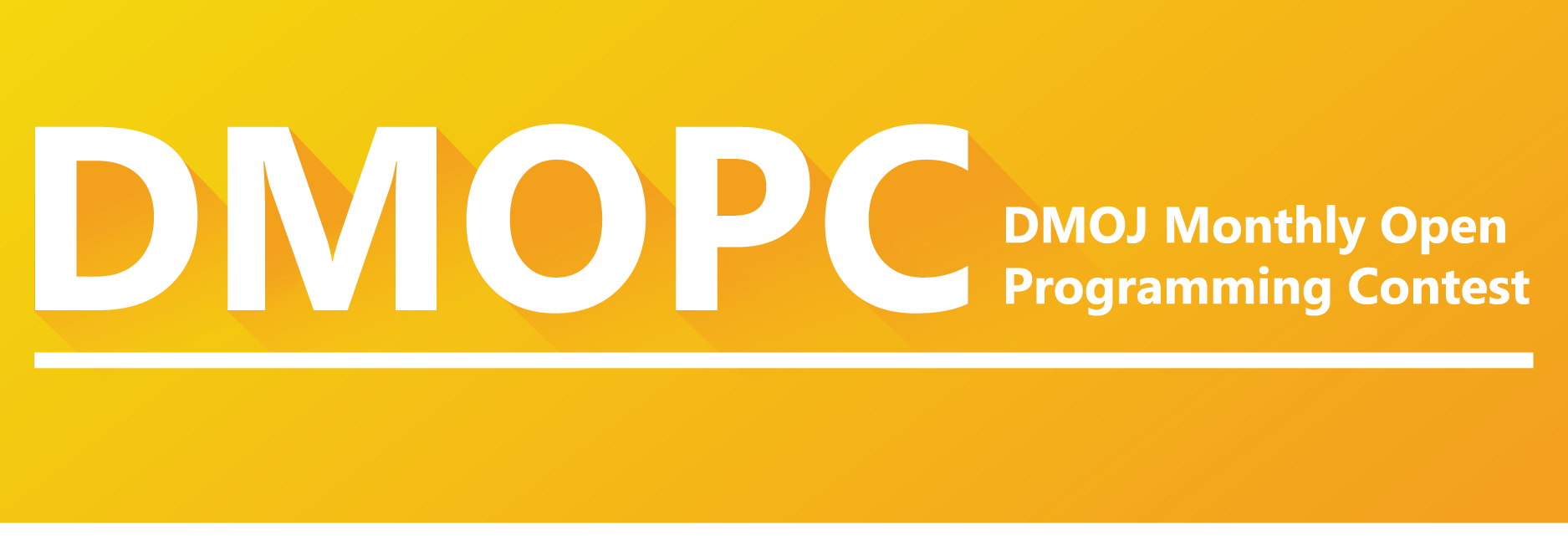DMOPC '21 June Contest

Welcome to the tenth and final DMOJ Monthly Open Programming Competition of the 2021-2022 season!
The contest organizers this time are , , and .
UPDATE: Thanks for writing the contest! The problem writers this time were , , and .
Thanks to , , , , , , , , and for testing and feedback on the problems.
This round will be rated for all participants.
Before the contest date, you may wish to check out the tips and help pages.
This contest will consist of 6 problems, the difficulty of which may range anywhere from CCC Junior to CCO level.
You will have 3 hours to complete the contest. After the contest window begins, you may begin at any time. Once you enter the contest, your personal timer will start counting down and you will be able to submit until 3 hours from when you started, or until the hard deadline (00:00:00 EDT of June 28th), whichever comes first.
After joining the contest, you proceed to the Problems tab to begin.
Here are the parameters of the contest:
- Some problems offer partial marks in the form of subtasks. Specifically, for problems with subtasks, batch dependencies will be structured as follows: if the set of cases possible for a subtask B is a superset of the cases for a previous subtask A and any case in A produced a non-accepted verdict, the cases in B will not be executed. This system will continue to be used moving forward.
- Ties will be broken by the maximum submission time that increased score with no penalties.
- A maximum of 50 submissions will be allowed per problem.
- Scoreboard will be hidden, until your window is over. Divulging the contents of the scoreboard to participants who have not finished their window is an offense, the punishments of which are listed below.
- Problems will be approximately increasing in difficulty, and will all have full feedback. Reading all of the statements is recommended.
- Checkers: unless otherwise specified, standard.
- Interactors: unless otherwise specified, assume that all interactors are not adaptive.
- Rated for opening the contest. Being able to read the problems will cause the contest to be rated.
- It is guaranteed that all the problems will be solvable with C++, and all time limits will be at least 2x the runtime of the reference solution.
We have listed below some advice as well as contest strategies:
- Remove all extra debugging code and/or input prompts from your code before submitting. The judge is very strict — most of the time, it requires your output to match exactly.
- Do not pause program execution at the end. The judging process is automated. You should use stdin / stdout to perform input / output, respectively.
- Python users are recommended to use PyPy 2/3 over Python 2/3 when submitting.
Clarification requests for the contest must be routed through the clarification system provided on DMOJ, and not through other channels including but not limited to Discord and Slack. Furthermore, all clarification requests will be handled the way they normally are in IOI. Note that, in particular, clarification requests must come in the form of yes/no questions.
Due to rampant issues with cheating on contests that has happened recently, any suspicious behavior during the contest window may result in your rating being impacted negatively. Such behavior includes, but is not limited to:
- Divulging the contents of the scoreboard to participants who have not finished their window.
- Registering for the contest with at least two accounts.
- Participating in the contest with an account that is not your primary account.
- During the contest window, talking about the contest in more detail than answering a yes/no question about whether one participated in the contest. This includes, but is not limited to, posting spoilers about the contest and public speculation of the contest.
- Attempting to exploit bugs in the platform to subvert the constraints of the contest.
- Attacking the judge infrastructure, other contestants, or contest personnel within or after your window.
Punishments may include performance being unrated or, for more serious infractions, being forcibly ranked at the bottom of the scoreboard.
At the end of the contest, you may comment below to appeal a judging verdict. In the case of appeals, the decision(s) of DMOJ staff is final.
Problems
| Problem | Points | AC Rate | Users | Editorials |
|---|---|---|---|---|
| DMOPC '21 Contest 10 P1 - Japaneasy | 5 | 35.5% | 243 | Editorial |
| DMOPC '21 Contest 10 P2 - Cycle Sort | 7p | 11.8% | 170 | Editorial |
| DMOPC '21 Contest 10 P3 - Peculiar Reflections | 12p | 16.4% | 106 | Editorial |
| DMOPC '21 Contest 10 P4 - Bitwise Telephone | 17p | 3.9% | 31 | Editorial |
| DMOPC '21 Contest 10 P5 - Number Theory | 20p | 44.3% | 198 | Editorial |
| DMOPC '21 Contest 10 P6 - Median Replace | 25p | 19.6% | 31 | Editorial |
Comments
Why does P3 have such tight TL for Python? :(
Python is... not really considered when problems are set. The fact of the matter is that despite how much I love python, because it's so much slower than C++, sometimes it's not reasonable to support, and because of the extra organizational burden of supporting it and the relative scarcity, it's only supported by accident, really.